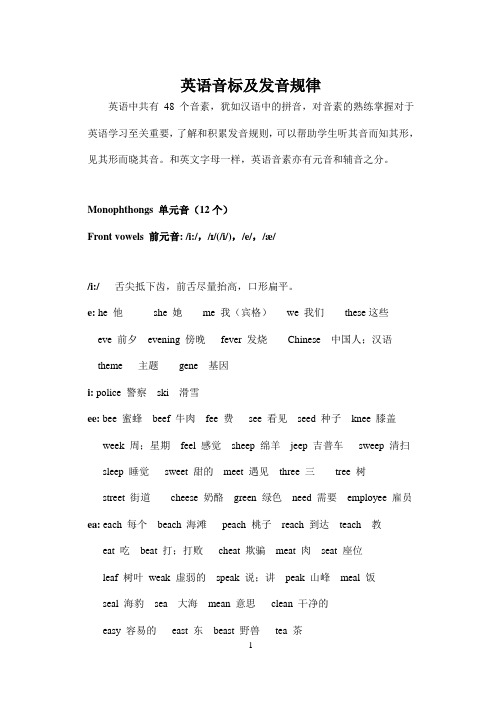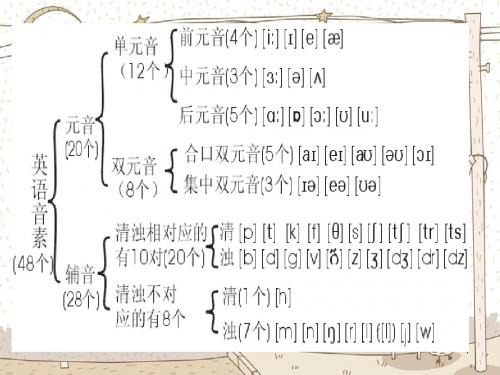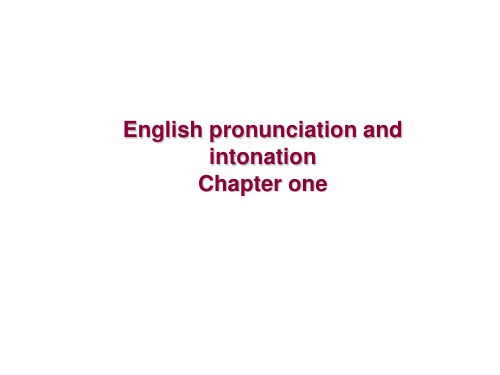前元音front-vowels
英语音标及发音规律 -

英语音标及发音规律英语中共有48个音素,犹如汉语中的拼音,对音素的熟练掌握对于英语学习至关重要,了解和积累发音规则,可以帮助学生听其音而知其形,见其形而晓其音。
和英文字母一样,英语音素亦有元音和辅音之分。
Monophthongs 单元音(12个)Front vowels 前元音: /i:/,/ɪ/(/i/),/e/,/æ//i:/ 舌尖抵下齿,前舌尽量抬高,口形扁平。
e: he 他she 她me 我(宾格)we 我们these这些eve 前夕evening 傍晚fever 发烧Chinese 中国人;汉语theme 主题gene 基因i: police 警察ski 滑雪ee: bee 蜜蜂beef 牛肉fee 费see 看见seed 种子knee 膝盖week 周;星期feel 感觉sheep 绵羊jeep 吉普车sweep 清扫sleep 睡觉sweet 甜的meet 遇见three 三tree 树street 街道cheese 奶酪green 绿色need 需要employee 雇员ea: each 每个beach 海滩peach 桃子reach 到达teach 教eat 吃beat 打;打败cheat 欺骗meat 肉seat 座位leaf 树叶weak 虚弱的speak 说;讲peak 山峰meal 饭seal 海豹sea 大海mean 意思clean 干净的easy 容易的east 东beast 野兽tea 茶pea 豌豆treat 对待;款待read 读cream 奶油ie: believe 相信piece 一片;一张niece 侄女;外甥女field 田野thief 小偷ei: ceiling 天花板ey: key 钥匙;键/ɪ/舌尖抵下齿,舌前部抬高,舌两侧抵上齿两侧,口形偏平。
i: chick 小鸡pick 采;摘sick 生病的tick 滴答声stick 棍子kid 小孩big 大的dig 挖fig 无花果wig 假发pig 猪ill 生病的bill 账单hill 小山will 意愿;将要in 在…里面chin 下巴pin 别针thin 瘦的win 赢is 是this 这个kiss 吻miss 想念;错过pink 粉色think 想ink 墨水it 它hit 打;击fit 健康的;合适的sing 唱歌swim 游泳ship 轮船him 他(宾格)window 窗户e: exam 考试eraser 橡皮eleven 十一expensive 昂贵的excuse 原谅telephone 电话elephant 大象mechanic 机械师u: busy 忙的minute 分钟y: happy 快乐的angry 生气的sunny 晴朗的cloudy 多云的rainy 有雨的bicycle 自行车baby 婴儿city 城市lazy 懒的busy 忙的hungry 饿的thirsty 渴的ey: money 钱monkey 猴子honey 蜂蜜/e/ 舌尖抵下齿,舌前部稍抬起,唇形中长,发音时声带振动。
(完整版)英语语音发音部位及方法

英语语音发音部位及方法第一章发音部位一、发音器官二、唇形(口型)(1)双唇紧闭(2)自然开口(3)扁唇:微笑(4)大圆唇:尽量张大口(5)小圆唇:口型渐渐变小第二章元音(Vowel)发音方法一、单元音(Monophthong)1.前元音(4 Front Vowels)1)/i:/——舌尖抵下齿龈,但不要抵得太紧。
略略扁唇,像微笑的口型。
发音时间略长。
(Open your mouth just a little for the sound. Spread your lips into a smile. Push your tongue forward in your mouth. It’s a long sound. Move your tongue up a little as you say it.)2) /I/(/i/)——先发/i:/,在此基础上,嘴角稍微收小一点,开口略大一点,舌尖靠近,但不要紧贴下齿龈,发音时间相对较短。
(Open your mouth just a little more for this sound. Don’t spread your lips into a smile. The sound is shorter, more relaxed than /i:/.)3)/e/(ε)——舌尖抵下齿龈,不要抵得太紧。
口略开,约可放入一个指尖。
不扁唇,口型自然放松,发音时间相对较短。
(Practice the sound /I/, then open your mouth a little more for this sound. It is a short and relaxed sound.)4)/æ/——舌尖抵下齿龈,双唇尽量向两边张开,嘴角肌肉感到紧张。
开口程度大,约可放入食指和中指交叠。
不扁唇。
(Practice the sound / e /, then open your mouth a little more for this sound.)2.后元音(5 Back Vowels)1)/a:/——松弛自然,口张到最大,不要撅嘴,舌尖离开下齿龈,长元音。
前,中,后,双元音

• 中元音:[Central Vowels] [ɜ:] [ə] [ʌ] 舌尖靠下齿,舌中部向硬颚抬起, 舌平放口中, 不抵下齿背;口腔各部分都很自然, 肌肉松弛。 • 发 / ə/ 音时, 牙床半开, 双唇中常,只要 • 一张口就可发出 / ə/ 音, 它是12个单元音中最弱 、最模糊的一个音。
5
合口双元音 (closing diphthongs) 合口双元音的特点是:发音时口腔动 作从开到合,最终滑动成为一个音;舌 位从低到高;前一个元音清楚而较长 , 后一个则模糊而较短.
集中双元音 ( centring diphthongs ) 与合口双元音最大的不同 点是:最后不能滑动成为一个音, 而只是 从前面的元音向后面的元音集中。
3
• Listening practice
• 后元音: [Back Vowels] • [ɑ:] [ɒ] [ɔ:] [u ] [u:] [ʌ] 舌尖离开下齿,平放在口中,舌身后缩.舌后部向 软颚抬起, • 圆唇音, 唇依次缩小, 发/ u: / 音时就成了小 • 圆唇了。发 / ɑ : / 音时牙床开得最大, 依次缩 • 小, 到发 / u:/ 音时牙床开得最小。
1
I.前元音:[Front Vowels] [ i:] [I ] [ e ] [æ] 舌尖抵下齿,舌前部向硬颚抬起,但不同的 前元音舌前部抬起的高度不同.上下齿之间的 距离不同.发 / i:/音时前舌抬得最高, 发/ æ /音时 前舌最低。发/ i: / 音时牙床开得最小, 发/ æ /音 时牙床开得最大。唇的扁平程度和肌肉的紧张 程度也不同。但是 / æ / 虽然不带“:”, 但
前元音中元音和后元音

前元音中元音和后元音 GE GROUP system office room 【GEIHUA16H-GEIHUA GEIHUA8Q8-元音分类1:前元音、中元音和后元音根据元音发音过程中舌头在口腔中抬起的部位不同,我们可以把元音分为前元音、中元音和后元音。
(1) Front(前元音)4The front vowels in English are the vowels that are articulated near the front of the oral cavity, such as:发前元音时,发音部位靠近口腔前部。
例如:1./i:/ 前、高、不圆唇、长元音;2. /i/ 前、半高、不圆唇、短元音;3./e/ 前、半高、不圆唇、短元音;4. /æ/ 前、低、不圆唇、短元音.(2) Central(中元音)2The central vowels in English are the vowels that are articulated near the center of the vocal cavity, such as:发央元音时,发音部位靠近口腔中ә部。
例如:1./ә/ 中、半高、不圆唇、长元音;2. /ә:/ 中、半低、不圆唇、短元音.(3) Back(后元音)6The back vowels in English are the vowels that are articulated near the rear of the vocal cavity, such as:发后元音时,发音部位靠近口前后部。
例如:1./u/ 后、高、圆唇、短元音;2. /u:/ 后、高、圆唇、长元音;3./ɔ/ 后、低、圆唇、短元音;4./ɔ:/后、半低、圆唇、长元音;5./Λ/后、半低、不圆唇、短元音;6./a:/ 后、低、不圆唇、长元音.单元音和双元音根据元音的构成要素,我们可以把元音分为12个单元音(monophthongs)和8个双元音(Diphthongs)。
元音音素的发音规律

each 每个 beach 海滩 teach 教 eat 吃 meat 肉 seat 座位 seal 海豹 sea 大海 easy 容易的 east 东
peach 桃子 reach 到达
beat 打;打败 heat 热量
leaf 树叶
weak 虚弱的
mean 意思 clean 干净的
tea 茶
meal 饭
turn 转身;次序 turkey 火鸡 purple 紫色的
burn 燃烧 nurse 护士 church 教堂
hurt 受伤 purse 钱夹 surf 冲浪
在单词中字母组合or在w之后可以读作/ɜː/
word 单词 world 世界 worm 蠕虫 worse 更糟的
work 工作 worst 最糟的
leg 腿 spell 拼写 well 好 desk 课桌 nest 鸟巢
bell 铃铛 sell 卖 let 让 best 最好的 west 西
字母组合ea在单词中可以读作/e/
feather 羽毛 weather 天气 health 健康 wealth 财富 pleasant 令人愉快的 breakfast 早餐 heavy 重的
boot 靴子 shoot 射击 fool 愚人 stool 凳子 moon 月亮 zoo 动物园
room 房间 broom 扫帚 choose 选择 loose 松的 foolish 愚蠢的 school 学校 cool 凉爽的 wool 羊毛 noon 中午 soon 很快 too 也;太 roof 屋顶
字母组合ear在单词中可以读作/ɜː/
early 早的 earth 地球
earn 挣 search 寻找
learn 学习 pearl 珍珠
front vowels前元音

Additional information
Differences between American and British English with the front vowels: /i/ /I/ & /i:/ /i/ * Comparison. The pronunciations of American vowel /i/ and British vowel /i:/ are almost the same. The American vowel /i/ has no long sound symbol “:”, because the length of the vowel is not absolutely the same. The length is varied according to the different situations. It is often longer when it is used at the end of a word or in front of a voiced consonant; while it is usually shorter after a voiceless consonant. (Compare: meal, meat, and me.) So, there is no “:” in American phonetic system. The pronunciations of American vowel /I/ and British vowel /i/ are almost the same.
Sing Together
Doe, a deer, a female deer Ray, a drop of golden sun Me, a name I call myself Far, a long long way to run Sew, a needle pulling thread La, a note to follow sew Tea, a drink with jam and bread That will bring us back to doe, oh, oh, oh…
英语语音知识及语言学知识
英语语音知识【音素phoneme】The phoneme is the smallest unit of speech sound in a language that is capable of conveying a distinction in meaning,音素是构成音节的最小单位或最小的语音片段。
Front vowels(前元音):/i:/, /I/, /e/, /æ/Pure V owels/Monophthongs(单元音) Central vowels(中元音):/ə:/, /ə/V owels(元音) Back vowels(后元音):/ɔ/, /ɔ:/, /u/, /u:/, /ʌ/, /a:/(20) Falling diphthongs(合口双元音):/ei/ , /əu/, ai/, /au/, /ɔi/Diphthongs(双元音)Phoneme Rising diphthongs(集中双元音):/iə/, /ε/, /ə/, /uə/Stops(爆破音):/p/, /b/. /d/, /t/, /k/, /g/Fricatives(摩擦音):/f/, /v/, /θ/, /ð/, /s/, /z/, /ʃ/, /ʒ/, /h/Consonants(辅音) Affricates(塞擦音):/ts/, /dz/, /tr/, /dr/(28) Lateral(边音):/l/Nasals(鼻音):/m/, /n/, /ŋ/Approximants(半元音):/w/, /r/, /j/语言学知识Morpheme that occur “unattached” are called free morpheme.Inquiry and discovery learning is to involve learners in investing energy and attention in order to discoversomething about the language for themselves.Sapir-Whorf hypothesis is also known ad linguistic relativity.Pragmatic competence requires teacher to help learners to learn the relationship between grammatical formsand function.Phonetics is the study of the phonic medium of language; it is concerned with all the sounds that occur in theworld’s languages.Correct perception of sounds is vital for listening comprehension.Different stress and intonation indicate different meanings.The dialect which is caused by social status is socialect.The famous line “My love is a red, red rose”, stirs up vividly the imagination of a beautiful lady. This is theiconic meaning of “rose”.Linguistics is generally defined as the scientific study of language.The reasons for teaching writing to students of English as a foreign language include reinforcement, languagedevelopment, learning style and, most importantly, writing as a skill in its own right.The different phones which can represent a phoneme in different phonetic environment are called theallophones of that phoneme.Semantics is generally considered to be the study of meaning in language.。
前元音front vowels
5. Tongue twister: Some teachers’ teaching pleases some people but other people feel the same teaching isn’t pleasing. It isn’t easy to please each person but teasing the teacher won’t please the teacher and each teacher needs to be free to teach as he pleases.
4. tongue twister 1) Mary and Sally ran back together to gather the black hat and the black bag. 2) Swan swam over the sea. Swim. Swan, swim. Swan swam back again. Well swum, Awan. 5. little poem I met a little boy, Jack, Who comes from another land, I couldn’t speak his language. But I took him by the hand.
3. Passage My married sister lives in a pretty village. From the window of her cottage she can see the hills, churches and houses. On Sunday, like many English women, she never wastes a minute. She is busy doing her private business.
英语音标 English Vowels and Consonants
[r]舌头向上卷起,舌头不要接触任何部位,双唇稍突出,声带振动。
[h]自然呵气,自然张开,声带不振动(像喘气)。
Affricate consonants
破擦音
[tʃ]双唇略微张开突出,舌尖抵住上齿龈,用力吐气,舌尖离开上龈,声带不振动。
[u]嘴张开,略向前突出,发短促音。
Central vowels中元音
[ʌ]嘴巴张开,伸向两边,舌尖轻触下齿。
[ə:]嘴巴呈扁平,上下齿微张开,舌身平放。(长)
[ə]嘴巴呈扁平,上下齿微张开,舌身平放。(短)
Diphthongs双元音
Rising diphthongs
[ei]相当于发“A”
[ai]由开到合,“I”。
Nasal consonants
鼻辅音
[m]双唇紧闭,舌头平放,声带振动,气流从鼻子里送出来(鼻音).
[n]双唇微开,舌尖抵上齿龈,声带振动,气流从鼻子里送出来(鼻音).
[ŋ]双唇张开,舌尖抵下齿龈,舌根向后抵住,声带振动,气流从鼻子里送出来(鼻音).
Lateral consonant
边辅音
[l]舌尖抵住上齿龈,舌尖轻微用力弯曲,声带振动
[b]双唇紧闭,然后快速张开,爆破音,声带振动。
[t]用舌尖发音,抵住上齿龈形成阻碍(短促有力),声带不振动。
[d]用舌尖发音,抵住上齿龈形成阻碍(短促有力),声带振动。
[k]声带不振动,气从喉咙里用力冲出,舌后部抵住软腭。
[g]声带振动,气从喉咙里用力冲出,舌后部抵住软腭。
Fricative consonants
[ɔi]前重后轻,由圆到扁,稍快。
[əu]口型有半开到小开,像发“O”,发“ə”时舌尖抵下齿。
1 国际音标48音素 字母读音 词例
英语国际音标(48个音素)I.元音(Vowels)(20个):前元音(Front Vowels)(4个):/i:/ /ɪ/ /e/ /æ/中元音(Central Vowels)(3个):/∧/ /ǝ/ /ɜ:/后元音(Back Vowels)(5个):/ɑ:/ /D/ /ɔ:/ /ʊ/ /u:/合口双元音(Closing Diphthongs)(5个):/eɪ/ /ǝʊ/ /aɪ/ /aʊ/ /ɔɪ/集中双元音(Centering Diphthongs)(3个)/ɪǝ/ /eǝ/ /ʊǝ/ II.辅音(Consonants)(28个):(成对的辅音前为清辅音,红色标出;后为浊辅音;其余的单音为浊辅音。
)爆破音(Plosions)(6个):/P//b/ /t//d // k //g/摩擦音(Fricatives)(13个):/f//v//s//z//θ/ /ð//ʃ//ʒ //l/ /r/ /h/ /w/ / j /破擦音(Affricates)(6个):/ ʧ // ʤ // tr // dr//ʦ//ʣ/鼻音(Nasals)(3个):/m/ /n/ /ŋ/英语26个字母读音A a /eɪ/Bb/b i:/Cc/s i:/ Dd/d i:/ Ee/i:/Ff /e f/Gg/ʤi:/ Hh /eɪʧ/ Ii /aɪ/Jj/ʤeɪ/Kk/k eɪ/Ll/el/Mm/em/ Nn/en/ Oo/ǝʊ/Pp/P i:/Qq/ k ju:/Rr/ɑ:/Ss/e s/Tt/t i:/Uu /ju:/ Vv/v i:/Ww/'dЛb lju:/Xx/e ks /Yy/waɪ /Zz/z i:/(/z e d/)(注意:26个英语字母中,有12个字母是以元音发音开头的,红色标记,这些字母前若要用不定冠词是,只能用an。
a, e , i ,o ,u 这5个字母为元音字母,y 为半元音字母。
- 1、下载文档前请自行甄别文档内容的完整性,平台不提供额外的编辑、内容补充、找答案等附加服务。
- 2、"仅部分预览"的文档,不可在线预览部分如存在完整性等问题,可反馈申请退款(可完整预览的文档不适用该条件!)。
- 3、如文档侵犯您的权益,请联系客服反馈,我们会尽快为您处理(人工客服工作时间:9:00-18:30)。
Test pin/pen Ginny/ Jenny
bill/bell bitter/better chicks/checks
4.4 /æ / 舌尖抵下齿,双唇向两旁平伸,成扁平形,张开 牙床至上下齿之间可以容纳食指和中指的宽度 不要与/a:, e, ۸ /混淆
1. Words
Flag Canal Valley Happened pad pal hammer manager glad van am land catch ladder banner manner rally matter wrapper blacker exactly jacket Saturday Alice
2. Sentences 1) The heavier, the better. 2) Better late than never. 3) East or west, home is best. 4) Fetch the eggs from the nest. 5) Mend the fence when the weather’s better.
2. sentences 1)Have they carried the cash to the bank? 2) The rabbit dashed from the sandy bank. 3)Pack the baggage in the back of the taxi. 4)Sam’s let the cat out of the bag. 5)Pat married a handsome young man and had a happy family.
4. tongue twister 1) Mary and Sally ran back together to gather the black hat and the black bag. 2) Swan swam over the sea. Swim. Swan, swim. Swan swam back again. Well swum, Awan. 5. little poem I met a little boy, Jack, Who comes from another land, I couldn’t speak his language. But I took him by the hand.
Front vowels
前元音
英语中一共有四个前元音,发音的共同点是 舌前部以不同程度向硬腭抬起,舌尖抵下齿,唇扁 平。 /i:/ 舌尖抵下齿,舌前部向硬腭尽量抬起,没有摩 擦,双唇成扁平形。 /i:/比汉语’衣’发音长,没有摩擦。
Practice materials
1. Words bee key green clean deal heal meat niece
4. Dialogue Ed:Hi, Ellen! Hi, Fred! Hi, Jenny? Fred: Hi, Ed. Cigarette? Ed: No, thanks. Fred. Ellen: Help yourself to a drink. Jenny: Look on the shelf on your left. Fred: How did you spend you vocation, Ed? Ed: I went to Venice with a friend. Everybody: Well? Ellen: We’re all jealous. Ed: Was it expensive? Ed: Yes. Very. I spent everything I had. Jenny: Don’t you have any money left? Ed: Yes, Jenny. Ten cents.
5. Tongue twister Ted send Fred ten hens yesterday. So Fred’s fresh bread is ready already. 6. Little poem Good, better, best. Never let it rest. Till good is better. And better best.
1. Words
big win shiver miss pig lid limb tin pin pill mirror miller winner list lick pretty win still dinner witty tin kill sinner pity
2. Sentences 1) I think it’ll fit. 2)It’s a pity they missed the outing. 3) A little learning is a dangerous thing. 4) The kitten’s sitting near the river. 5) This is an interesting system.
Test
seat/ sit feel/ fill sheep/ship heel/hill feet/fit
leaves/ lives reason/ risen field/ filled sleep/slip green/grin
4.3 /e/ 舌尖抵下齿, 舌前部稍抬起, 比/i: / 低, 双唇稍 扁 不要和汉语拼音字母e混淆,拼音字母e读“鹅”音
3. passage The man in the black hat bent back the map. “Jack,” he said, “stand back. We’re in a jam. According to this plan, this piece of land is sand. So light the lamp and lend a hand.”
5. Tongue twister: Some teachers’ teaching pleases some people but other people feel the same teaching isn’t pleasing. It isn’t easy to please each person but teasing the teacher won’t please the teacher and each teacher needs to be free to teach as he pleases.
4. Dialogue Mrs. Kim: Hello, Bill. Hello, Lynn. Bill: Hi, Mrs. Kim. Is Jim in? Lynn: Is he coming with us to the film? Mrs. Kim: Oh, Jim’s sick. Bill: Here he is! Hi, Jim. Lynn: Are you sick, Jim? Jim: Is it an interesting film? Lynn: It’s “Billy the kid.” Bill: And it begins in six minutes. Mrs. Kim: Jim, if you are sick… Jim: Quick! Or we’ll miss the beginning of the film.
3. Passage “Believe me,” said Mr. Green to Peter. “You need a cup of tea, I can see.” “I am fine,”said Peter. “It’s just my feet. They seem to have gone to sleep. Please don’t repeat what you have seen to the people upstairs. They’ll bang on the ceiling again. And I have to call the police.” “Agreed. Where is the key? I’ll start the m a c h i n e . ”
4. Dialogue: In a restaurant Peter: What are you having to eat, Lee? Lee: I’ll have a roast beef sandwich. And some tea. Peter: Steve? Would you like a cheese sandwich or a roast beef sandwich. Steve: A cheese sandwich. I don’t eat meat. Waitress: Yes? Peter: We’d like one roast beef sandwich and two cheese sandwiches. Waitress: And would like coffee or tea? Peter: Three teas, please. Steve: Make that two teas. Coffee for me, please. Waitress: (Writing down the order.) One roast beef sandwich… two cheese sandwiches… two teas…one coffee.
3. Passage On Wednesday, the three deaf men went to Reading to bury their dead friend. “Death,” said Ed, “will come again many times. I guess Iter Will you sit still, Bill? I’ll sit as still as a hill. 6. Little poem “Tick” the clocks says, “tick, tick, tick!” What you have to do, do quick. Time is gliding fast away. For the country let us do our bit.
